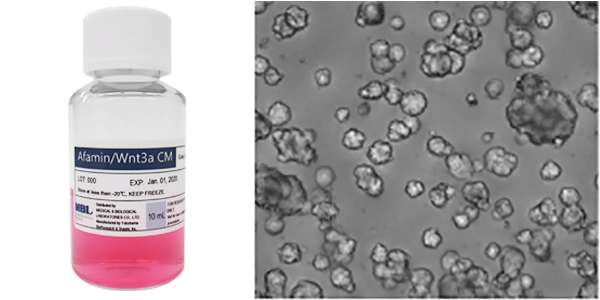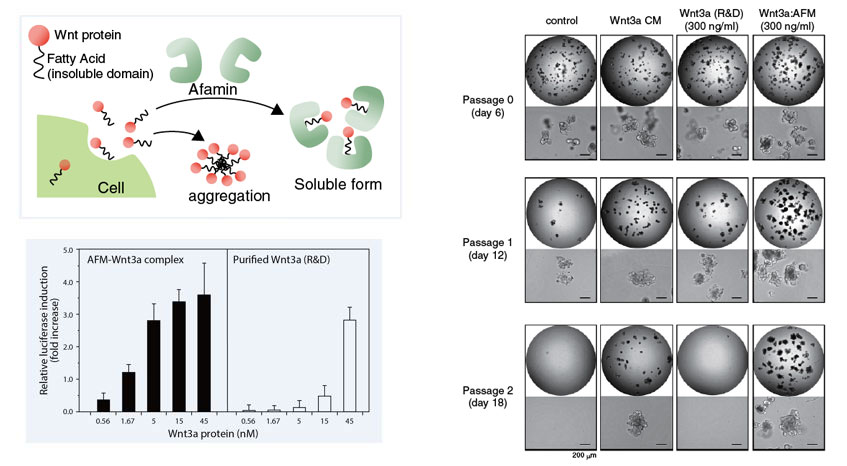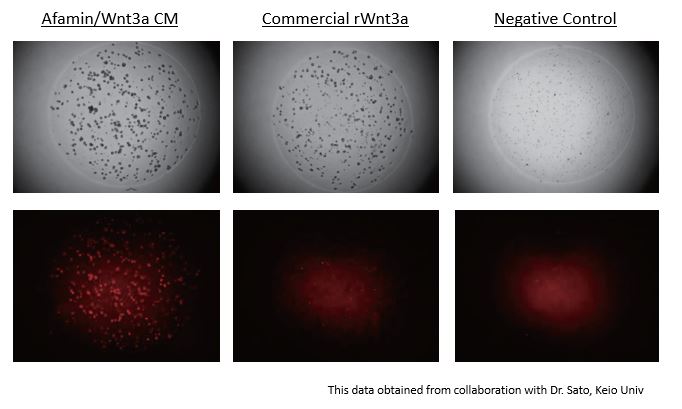FEATURE
- Serum Free
- Stabilized Wnt3a
- High Activity

Organoid culture
Wnt signaling is known to be involved in early development, maintenance and regeneration of stem cells, and in cancer formation. Wnt signaling has also been found to play an important role in the growth and maintenance of these processes. In particular, Wnt3a has been revealed to be an essential niche component for maintaining the proliferation of Lgr5-positive stem cells in intestinal epithelial cells and is used for the production of various digestive organoids such as the small intestine, large intestine, stomach, pancreas and liver. Although Wnt3a has been conventionally used for the culture of gut organoids, it is a fat-soluble protein, so it forms aggregates in serum-free medium and can not exert its activity sufficiently. In 2016, Mihara et al. found that high Wnt3a activity can be maintained by forming a complex with Wnt3a by Afamin, which is one of the components of serum. In addition, by using Afamin and Wnt3a complex for organoid culture, long-term culture of organoid becomes possible. This new medium will result in optimal success for your organoid experiments.
Mechanism of Wnt3a Stabilization by Afamin Proteins

Mihara, et al, eLife (2016) [PMID: 26902720]
Afamin/Wnt3a CM increased LGR5 Positive Stem Cells

Images on the top panels show a bright field of human color organoids. Images on the bottom panels show fluorescent LGR5 positive stem cells that express tdTomato regulated by Lgr5 promoter. Afamin/Wnt3a CM maintained LGR5 positive stem cell growth is seen at greater levels compared with cell growth in purified Wnt3a (300 ng/mL).
Product Highlight
| Product Code # | Product Name | Main Components | Size | Solvent |
|---|---|---|---|---|
| J2-001 | Afamin/Wnt3a CM | Mouse Wnt3a Human Afamin |
10 mL | Advanced D-MEM/F-12 |
Related Product: Recombinant Afamin/Wnt3a
Recombinant Afamin/Wnt3a was purified from the culture supernatant of CHO-K1 cells co-expressing Afamin and Wnt3a.
| Product Code # | Product Name | Main Components | Size | Solvent |
|---|---|---|---|---|
| J2-002 | Recombinant Afamin/Wnt3a | Mouse Wnt3a Human Afamin |
60 µg/300 µL | 20 mM Tris-HCl (pH 7.4), 150 mM NaCl |
Recombinant Afamin/Wnt3a increased LGR5 Positive Stem Cells
An organoid strain expressing tdTomato regulated by Lgr5 promoter was cultured in the presence of Recombinant Afamin/Wnt3a and Recombinant Wnt3a of competitor A. It was confirmed that Recombinant Afamin/Wnt3a maintains LGR5-positive cells even at low concentrations.
This data obtained from collaboration with Dr. Sato, Keio Univ.
Regarding to this product, we do not offer any non-infringement warranty when used or otherwise applied in combination with other factors. Therefore, if you intend to use this product in combination with other factors, please check with your organization’s division responsible for intellectual property rights or your research agency before using this product.
References
- E. Mihara, et al., Active and water-soluble form of lipidated Wnt protein is maintained by a serum glycoprotein afamin/α-albumin., eLife 5 (2016) [PMID: 26902720]
- K. Nanki, et al., Divergent routes toward Wnt and R-spondin niche independency during human gastric carcinogenesis., Cell 174 (2018) [PMID: 30096312]
- S. Sugimoto, et al., Reconstruction of the human colon epithelium in vivo., Cell Stem Cell 22 (2018) [PMID: 29290616]
- T. Seino, et al., Human pancreatic tumor organoids reveal loss of stem cell niche factor dependence during disease progression., Cell Stem Cell 22 (2018) [PMID: 29337182]
- S. Sugimoto, et al., Organoid Derivation and Orthotopic Xenotransplantation for Studying Human Intestinal Stem Cell Dynamics., Methods Mol Biol 2171 (2020) [PMID: 32705652]
- K. Nanki, et al., Somatic inflammatory gene mutations in human ulcerative colitis epithelium., Nature 577 (2020) [PMID: 31853059]
- N. Sasaki, et al., Development of a Scalable Coculture System for Gut Anaerobes and Human Colon Epithelium., Gastroenterology 159 (2020) [PMID: 32199883]
- S. Mae, et al., Expansion of Human iPSC-Derived Ureteric Bud Organoids with Repeated Branching Potential., Cell Reports 32 (2020) [PMID: 32726627]
- Y. Nanki, et al., Patient-derived ovarian cancer organoids capture the genomic profiles of primary tumours applicable for drug sensitivity and resistance testing., Scientific Reports 28 (2020) [PMID: 32724113]
- K. Miyabayashi, et al., Intraductal transplantation models of human pancreatic ductal adenocarcinoma reveal progressive transition of molecular subtypes., Cancer Discov 10 (2020) [PMID: 32703770]
- JS. Roe, et al., Enhancer Reprogramming Promotes Pancreatic Cancer Metastasis., Cell 170 (2017) [PMID: 28757253]
- H. Tiriac, et al., Successful creation of pancreatic cancer organoids by means of EUS-guided fine-needle biopsy sampling for personalized cancer treatment., Gastrointest Endosc 87 (2018) [PMID: 29325707]
- H. Tiriac, et al., Organoid Profiling Identifies Common Responders to Chemotherapy in Pancreatic Cancer., Cancer Discov 8 (2018) [PMID: 29853643]
- H. Oshima, et al., Stat3 is indispensable for damage-induced crypt regeneration but not for Wnt-driven intestinal tumorigenesis., FASEB J 33 (2019) [PMID: 30156908]
- M. Fujii, et al., Human Intestinal Organoids Maintain Self-Renewal Capacity and Cellular Diversity in Niche-Inspired Culture Condition., Cell Stem Cell 23 (2018) [PMID: 30526881]
- K. Kawasaki, et al., Chromosome Engineering of Human Colon-Derived Organoids to Develop a Model of Traditional Serrated Adenoma., Gastroenterology 158 (2020) [PMID: 31622618]
- K. Kawasaki, et al., An Organoid Biobank of Neuroendocrine Neoplasms Enables Genotype-Phenotype Mapping., Cell 183 (2020) [PMID: 33159857]
- K. Togasaki, et al., Wnt Signaling Shapes the Histologic Variation in Diffuse Gastric Cancer., Gastroenterology 160 (2021) [PMID: 33217450]
- S. Sugimoto, et al., An organoid-based organ-repurposing approach to treat short bowel syndrome., Nature 592 (2021) [PMID: 33627870]
- T. De Oliveira, et al., Effects of the Novel PFKFB3 Inhibitor KAN0438757 on Colorectal Cancer Cells and Its Systemic Toxicity Evaluation In Vivo., Cancers (Basel) 13 (2021) [PMID: 33671096]
- T. Nishina, et al., Interleukin-11-expressing fibroblasts have a unique gene signature correlated with poor prognosis of colorectal cancer., Nat Commun 12 (2021) [PMID: 33863879]
- T. Ebisudani, et al., Direct derivation of human alveolospheres for SARS-CoV-2 infection modeling and drug screening., Cell Rep 35 (2021) [PMID: 34038715]
- D. Kim, et al., 3D Organoid Culture From Adult Salivary Gland Tissues as an ex vivo Modeling of Salivary Gland Morphogenesis., Front Cell Dev Biol 9 (2021) [PMID: 34458260]
